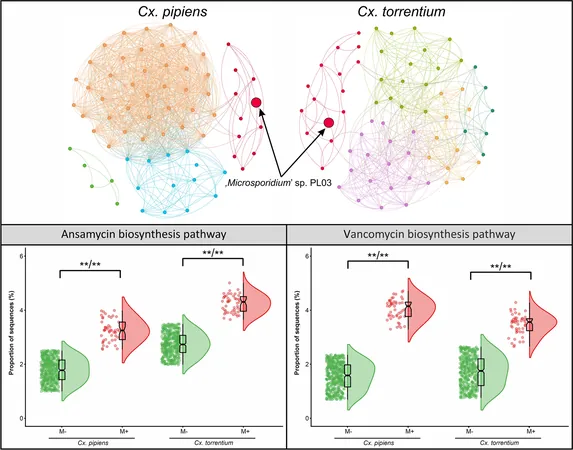
How Microsporidian Infections Transform Mosquito Larvae's Microbiome and Boost Antimicrobial Defenses
2025-05-17
Author: Mei
The Hidden Impact of Microsporidian Infections on Mosquitoes
Microsporidians, a group of obligate intracellular parasites, are wreaking havoc inside mosquito larvae, specifically Culex pipiens and Culex torrentium. But it's not all doom and gloom; these infections are reshaping the mosquitoes' microbiomes, enhancing their ability to fight off harmful pathogens.
The Intriguing Effects on Microbiome Composition
A groundbreaking study revealed that infected larvae had distinct bacterial communities, characterized by groups such as Aerococcaceae, Lactobacillaceae, and Myxococcaceae. Notably, the presence of Weissella cf. viridescens and Wolbachia pipientis showed strong correlations with microsporidian infections. The research suggests that these infections not only change which bacteria thrive but also enrich the microbiome with biosynthetic pathways for potent antibiotics like ansamycin and vancomycin.
A Double-Edged Sword: Infection vs. Antibiotic Production
The discovery that microsporidian infection enhances the microbial community's antimicrobial capabilities is revolutionary. By ramping up the production of antibiotics, these larvae may be better equipped to fend off other pathogens, potentially increasing their survival against numerous environmental threats.
Exploring the Connection Between Microbiome and Pathogen Interaction
The interplay between microsporidians and their mosquito hosts sheds light on complex ecological dynamics. While these parasites are typically viewed as detrimental, their influence on microbiome composition suggests a fascinating twist: they could inadvertently bolster mosquito resilience against infections.
Potential Implications for Disease Control and Vector Competence
Understanding how these microsporidians interact with the microbiome could lead to new strategies in controlling mosquito populations—potentially reducing the transmission of human and animal diseases. Could harnessing this natural defense mechanism help manage malaria and other mosquito-borne illnesses?
Future Directions for Research and Control Strategies
This study opens the door to future research focusing on the functional roles of bacteria within the mosquito microbiome. Investigating how these microbiota shift in response to infections can pave the way for innovative microbiome-based approaches to combat vector-borne diseases. It's time to rethink our strategy in controlling these pesky bloodsuckers!




 Brasil (PT)
Brasil (PT)
 Canada (EN)
Canada (EN)
 Chile (ES)
Chile (ES)
 Česko (CS)
Česko (CS)
 대한민국 (KO)
대한민국 (KO)
 España (ES)
España (ES)
 France (FR)
France (FR)
 Hong Kong (EN)
Hong Kong (EN)
 Italia (IT)
Italia (IT)
 日本 (JA)
日本 (JA)
 Magyarország (HU)
Magyarország (HU)
 Norge (NO)
Norge (NO)
 Polska (PL)
Polska (PL)
 Schweiz (DE)
Schweiz (DE)
 Singapore (EN)
Singapore (EN)
 Sverige (SV)
Sverige (SV)
 Suomi (FI)
Suomi (FI)
 Türkiye (TR)
Türkiye (TR)
 الإمارات العربية المتحدة (AR)
الإمارات العربية المتحدة (AR)